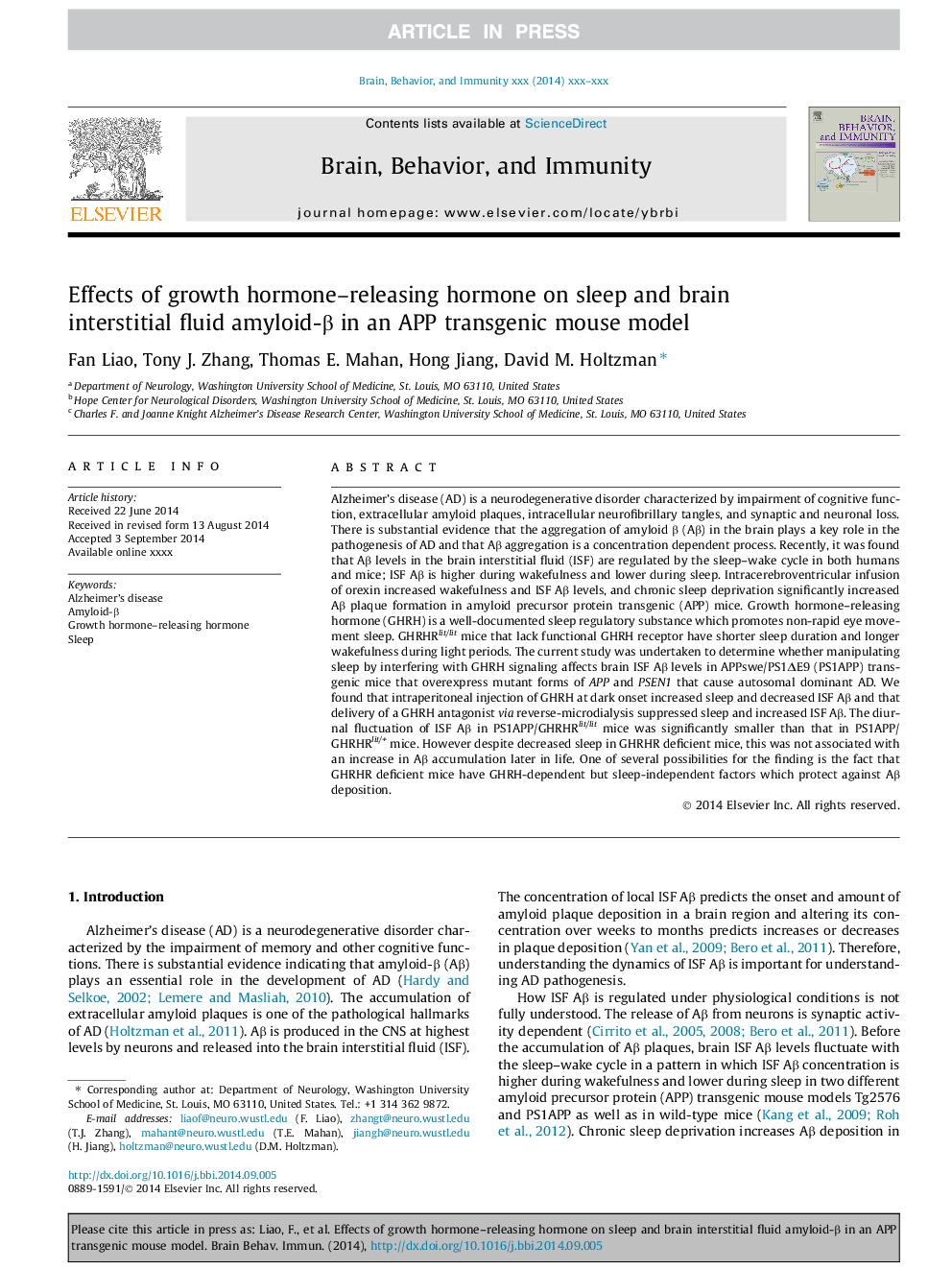| کد مقاله | کد نشریه | سال انتشار | مقاله انگلیسی | نسخه تمام متن |
|---|---|---|---|---|
| 7281095 | 1473920 | 2015 | 9 صفحه PDF | دانلود رایگان |
عنوان انگلیسی مقاله ISI
Effects of growth hormone-releasing hormone on sleep and brain interstitial fluid amyloid-β in an APP transgenic mouse model
دانلود مقاله + سفارش ترجمه
دانلود مقاله ISI انگلیسی
رایگان برای ایرانیان
موضوعات مرتبط
علوم زیستی و بیوفناوری
ایمنی شناسی و میکروب شناسی
ایمونولوژی
پیش نمایش صفحه اول مقاله

چکیده انگلیسی
Alzheimer's disease (AD) is a neurodegenerative disorder characterized by impairment of cognitive function, extracellular amyloid plaques, intracellular neurofibrillary tangles, and synaptic and neuronal loss. There is substantial evidence that the aggregation of amyloid β (Aβ) in the brain plays a key role in the pathogenesis of AD and that Aβ aggregation is a concentration dependent process. Recently, it was found that Aβ levels in the brain interstitial fluid (ISF) are regulated by the sleep-wake cycle in both humans and mice; ISF Aβ is higher during wakefulness and lower during sleep. Intracerebroventricular infusion of orexin increased wakefulness and ISF Aβ levels, and chronic sleep deprivation significantly increased Aβ plaque formation in amyloid precursor protein transgenic (APP) mice. Growth hormone-releasing hormone (GHRH) is a well-documented sleep regulatory substance which promotes non-rapid eye movement sleep. GHRHRlit/lit mice that lack functional GHRH receptor have shorter sleep duration and longer wakefulness during light periods. The current study was undertaken to determine whether manipulating sleep by interfering with GHRH signaling affects brain ISF Aβ levels in APPswe/PS1ÎE9 (PS1APP) transgenic mice that overexpress mutant forms of APP and PSEN1 that cause autosomal dominant AD. We found that intraperitoneal injection of GHRH at dark onset increased sleep and decreased ISF Aβ and that delivery of a GHRH antagonist via reverse-microdialysis suppressed sleep and increased ISF Aβ. The diurnal fluctuation of ISF Aβ in PS1APP/GHRHRlit/lit mice was significantly smaller than that in PS1APP/GHRHRlit/+ mice. However despite decreased sleep in GHRHR deficient mice, this was not associated with an increase in Aβ accumulation later in life. One of several possibilities for the finding is the fact that GHRHR deficient mice have GHRH-dependent but sleep-independent factors which protect against Aβ deposition.
ناشر
Database: Elsevier - ScienceDirect (ساینس دایرکت)
Journal: Brain, Behavior, and Immunity - Volume 47, July 2015, Pages 163-171
Journal: Brain, Behavior, and Immunity - Volume 47, July 2015, Pages 163-171
نویسندگان
Fan Liao, Tony J. Zhang, Thomas E. Mahan, Hong Jiang, David M. Holtzman,